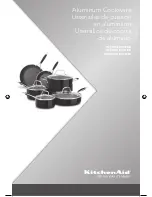
15
• Although cast iron is hard wearing, it is best to preheat the pan on the stovetop
or in the oven. Placing a cold pot into a hot oven may result in thermal shock
and damage your pan.
MAINTENANCE
• Always cool a hot pan for a few minutes before washing. Never plunge a hot
pan into cold water.
• Don’t soak in water for longer period.
• If there is food residue inside the pan, fill the pan with warm water and let it soak
for 15 to 20 minutes before washing.
• Do not use steel wool or abrasive cleaning agents for cleaning, this may scratch
the surface or damage the enamel.
• Completely hand dry cookware immediately after washing.
• Season the rim with cooking oil before and after each use to prevent rust. Wipe
it well with a clean cloth and leave to air dry before storing.
• After using the cookware or before storing, we suggest that you apply a small
amount of cooking oil on the interior and the rim of the pan. This can help
maintain the cookware.
• The cookware is made of enamelled cast iron, it is a normal phenomenon
to see rusting on the rim and along the side of the vessel. We recommend
applying a small amount of cooking oil in your cookware and rub it for 2-3 times
to remove the rust.
• We strongly recommend washing by hand.
• Never store pans while they are still damp. Store pans in a dry cupboard or airy
space away from steam.
• Do not stack or store the cookware without protection to avoid the enamel from
rubbing against each other and causing damage. The cookware can best be
stored using the plastic clips between the lid and the pan for better protection.
• Misuse of the product, cooking acidic ingredients or storage in an unsuitable
place may result in rust.
OTHER RECOMMENDATIONS
• Always match the pan’s base size to the stovetop heat zone to maximize
efficiency, and to prevent overheating of the pan sides or damage to the
handles.
5604_Use-Care_vivo_Cast_Iron.indd 15
15/07/16 14:59






























